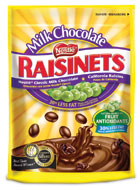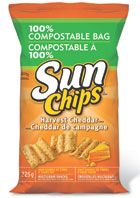
Redesigned packaging for Nestlé’s Raisinets reinforces the health image by showing the fruit “transitioning” from fresh to dried.
Think and do
For Think Products, which makes ThinkThin high-protein, sugar-free bars and recently launched ThinkThin Bites, simplicity is the watchword for package design. Graphics on Think’s paperboard cartons and wrappers are crisp and uncluttered, featuring photography of flavor-related foods falling down the side of the package.The company worked withAddis Cresonto create the impactful package design, which replaced the brand’s busier original design. In the bar category, “there is over-communication. I think that when you have a message that is so simple, it should be delivered in a simple way,” says Lizanne Falsetto, chief executive officer of Think Products.
“And that is why our packaging now is very clean, very simple,” Falsetto adds. “It really pops amongst the mess of the bar category, where everybody has filled every spot on their wrapper.”
In keeping with the ThinkThin brand philosophy of deliciously natural weight management, the cartons and wrappers display key nutritional data, such as “0g sugar” and product-specific protein and calorie content, while maintaining plenty of white space.
Although the design is simple, executing it was not. Photographing the flowing food items has been challenging, Falsetto says, adding, “I would have to say that having simplicity is harder than not.”
The ThinkThin products, including a new line of high-protein, gluten-free dessert bars, are sold at Whole Foods Market and Trader Joe’s and in the natural-foods aisle of mainstream grocery stores. Falsetto reinforces the company’s natural weight management message on herblog.

New Sun Chips packaging touts the bag’s compostable makeup.
Crackers and chips
Newly redesigned packaging for Sticks & Twigs, a pretzel alternative from Mary’s Gone Crackers Inc., deftly communicates not only the product’s wheat-free, gluten-free, whole-grain character but also the brand’s gourmet positioning.Previously packaged in a glossy bag with a window revealing the product, Sticks & Twigs is now packaged in a matte-finish bag made of metallized film. The window is gone, but product photography shows what’s inside the package.
A band of text at the bottom of the bag tells consumers the product is artisan baked, allergy friendly, made in the USA and imbued with “tasty goodness.” Like the packaging for the company’s crackers, the Sticks & Twigs package graphics incorporate the USDA Organic seal and the Whole Grain Stamp.
The metallized film provides better product protection than the previous material, and the matte finish enhances print quality. “It’s a much cleaner, brighter package,” says Mary Waldner, chairman and founder of Mary’s Gone Crackers.
She adds that the matte finish also has a “more sophisticated look,” which portrays the product’s quality. “We appeal to an allergy-conscious crowd, but the taste profile crosses over into a gourmet product.”
Mary’s Gone Crackers plans to eventually print the Sticks & Twigs bags using soy inks, which the company already uses to print its recycled-paperboard cartons.
Frito-Lay has taken the earth-friendly approach even further, creating a 100% compostable bag for SunChips. The bags are 90% polylactic acid (PLA), a plant-based material supplied byNatureWorks LLC.
This first-of-its-kind package will debut in Canada in March. Together, the package and the product powerfully deliver a better-for-you/better-for-the-planet message.
The bilingual package boldly pronounces that it is 100% compostable. Text at the bottom on the bag also points out the product’s multigrain content, high fiber and zero trans fat.
PLA capacity limitations influenced Frito-Lay’s choice of Canada and SunChips as the launch region and brand for the compostable bag. The Canadian market for SunChips is “big enough to make an impact but small enough that we would have enough packaging,” says Seb Brandt, director of marketing for Frito-Lay Canada. The company plans to launch the package in the United States later this year.
Beyond the capacity issue, the SunChips brand is a good fit for the compostable bag because, as Brandt explains, “SunChips consumers are interested in their health and well-being but also that of the environment. That’s the strategy we have in place.”
